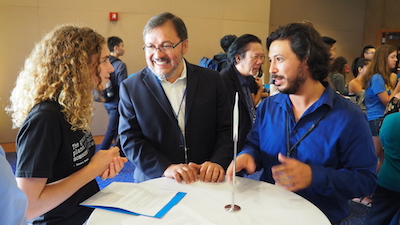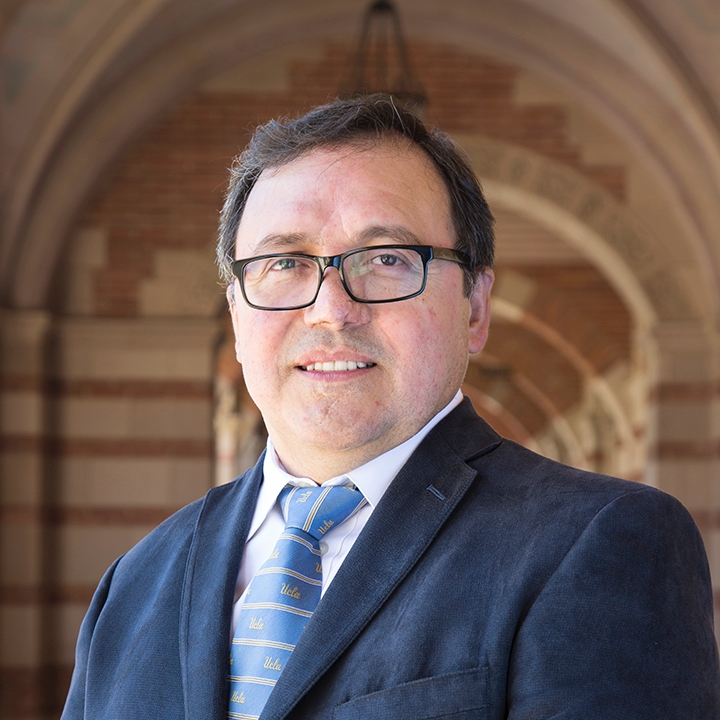Miguel García-Garibay, dean of the Division of Physical Sciences and distinguished professor of Chemistry & Biochemistry, has been elected to the American Academy of Arts & Sciencesfor his work in the field of chemistry.
García-Garibay received his B.S. degree from the University of Michoacan in Mexico and his Ph.D. from the University of British Columbia. He was a postdoctoral Fellow at Columbia University before joining the faculty in the Department of Chemistry & Biochemistry at UCLA. After serving as vice chair for education and as the chair of the Department of Chemistry & Biochemistry, he was appointed Dean of Physical Sciences in 2016.
The García-Garibay Research Group is dedicated to the study of solids and crystalline materials spanning a wide range of properties and length scales. García-Garibay achieved international reputation for work in reactive intermediates, solid-state organic chemistry, photochemistry, and crystalline molecular machines. He has authored over 230 articles and delivered more than 450 lectures worldwide.
Here, the dean shares his thoughts about joining the Academy:
As a member of the American Academy of Arts & Sciences, you join Physical Sciences colleagues who represent a wide and compelling range of scientific discovery. In what ways does UCLA benefit from having so many members of the academy among its faculty?
The American Academy of Arts and Sciences honors excellence and leadership across all intellectual disciplines. For UCLA to have over 100 current members among the faculty, with 28 of them calling Physical Sciences their home, is a clear indication that UCLA faculty work at the frontiers of all human endeavor, including all the sciences, arts and humanities, cultural studies, politics and many others.
Specifically, how do students benefit when academic leaders are recognized by societies such as the Academy? How does this type of recognition contribute to the quality of education at an institution like UCLA?
By learning from thought leaders in a wide range of disciplines, our students are exposed to the most important topics of our times. Bruins working with those faculty become part of scientific communities that have the tools and know-how to solve the most critical problems of the day and identify the most promising opportunities for the future.
What does election to such a prestigious body mean for your scientific research? Can you see new means of support and collaboration for what you do in the future that may not have been possible before this election?
My election to the Academy of Arts and Sciences mainly means that creative research leading to numerous bachelors, masters and Ph.D. degrees has made a significant impact in various fields of chemistry. Recognition like this helps strengthen the reputation of UCLA, and that helps attract the most diverse and talented students and postdocs. Not only do they have great ideas that make high quality science sustainable, but they also help attract resources that are needed to execute it.
How do you envision contributing to the mission of the Academy when you officially become a member this coming October? What areas of its mission are most compelling to you, and which do you see yourself actively working on?
My research in crystalline solids and emergent properties arising from a reduction of entropy will give generations of students an opportunity to learn some of the most interesting challenges in chemistry and materials science and perhaps invent the first generation of serviceable molecular machines.
But perhaps more importantly, I have the opportunity to attract and promote talented students from the most diverse backgrounds and expressions of human identity. I am convinced that science will prosper faster and in more promising new directions if we have a diversified talent pool.
Finally, how does it feel to have had such an honor bestowed upon you?
As a child growing up in central Mexico, and being a first-generation college graduate, I never imagined that I would have the privilege of being part of the UCLA faculty. Although once at UCLA I was aware that I was going to be able to do high quality research, it never crossed my mind that I could be elected to American Academy of Arts and Sciences. It is a great honor and it feels great.

More of García-Garibay’s accolades include being named a fellow of the American Chemical Society, the UCLA Staff Recognition award, the UCLA Diversity and Inclusiveness Award, a Special Creativity Award from the National Science Foundation, and selection as a fellow of the American Association for the Advancement of Science. He served two terms with the Chemical Sciences Roundtable of the National Academy of Sciences, and is now a member of the Advisory Committee of the NSF Mathematical & Physical Sciences Directorate.
Tags: News
 Garcia-Garibay also serves as dean of the division of physical sciences and senior dean of UCLA College
Garcia-Garibay also serves as dean of the division of physical sciences and senior dean of UCLA College